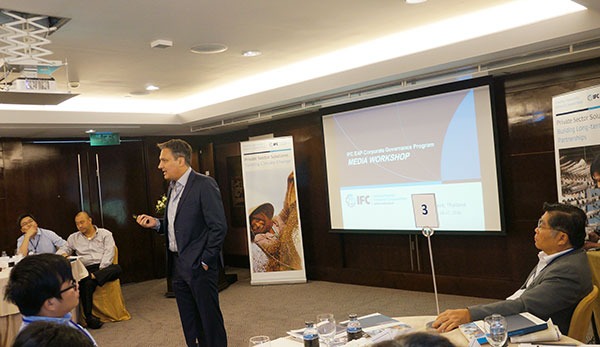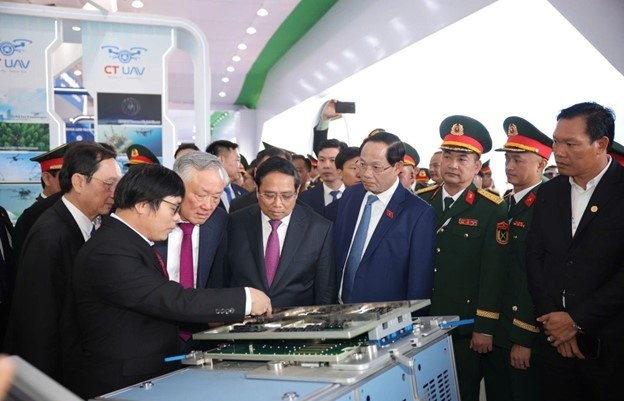IFC media workshop fosters corporate governance awareness
 |
Two dozen business editors and reporters from Cambodia, China, Indonesia, Lao PDR, Mongolia, Myanmar, the Philippines, Thailand, and Vietnam took part in the workshop in Bangkok to address key corporate governance issues, including state-owned enterprise and family-owned business structures, board leadership, risk management, as well as environmental and social standards.
“Having a deeper understanding of what constitutes good and bad corporate governance practices will improve journalists’ ability to spot red flags and uncover stories that are of public importance,” said Chris Razook, IFC Corporate Governance lead for East Asia and the Pacific. “The media can help champion transparency and accountability in public companies. Well-run companies are more profitable, sustainable, and are able to attract more foreign investment.”
Last year’s establishment of the Association of Southeast Asian Nations (ASEAN) Economic Community is expected to boost regional economic integration. Companies in ASEAN countries thus see an urgent need to improve market transparency and corporate governance practices, while raising their performance and competitiveness.
IFC is also meeting with representatives from the China Securities Regulatory Commission and stock exchanges in Hanoi, Ho Chi Minh City, and Shenzhen to discuss the challenges of promoting good corporate governance at their home markets.
“Recently, corporate governance reform has been at the top of the agenda for both regulators and companies in Vietnam, as businesses are seeking to improve their competitiveness amidst closer economic integration in the region,” said Nguyen Vu Quang Trung, deputy chief executive officer of the Hanoi Stock Exchange. “We appreciate opportunities to share knowledge with IFC and regional peers to catch up on new developments in corporate governance and discuss further collaboration.”
IFC works with the private sector in developing countries to build sustainable business lines. IFC’s East Asia Pacific Corporate Governance Program helps businesses to adopt good practices and standards to mitigate risks, prevent mismanagement, and attract the investment and capital needed to fuel their growth. The program is delivered in partnership with the Australian Department of Foreign Affairs and Trade, the Swiss State Secretariat for Economic Affairs, and the UK Department for International Development.
What the stars mean:
★ Poor ★ ★ Promising ★★★ Good ★★★★ Very good ★★★★★ Exceptional
Latest News
More News
- E-commerce race heats up with new player entering arena (December 19, 2024 | 16:03)
- Interest must rise for carbon exchange (December 19, 2024 | 16:00)
- Limitations abound for domestic EV carbon credits (December 19, 2024 | 15:00)
- Businesses pivotal in offsetting carbon measures in Vietnam (December 19, 2024 | 13:00)
- Coordination key for circular economy (December 19, 2024 | 10:56)
- Vietnam’s first logistics laboratory established (December 19, 2024 | 08:00)
- Masan Consumer Holdings honoured with consecutive "Great Place To Work" certifications (December 18, 2024 | 16:55)
- SABECO’s research facility a dream for its brewmasters (December 17, 2024 | 10:30)
- Digital twins reshaping Vietnam's logistics and supply chain landscape (December 17, 2024 | 09:34)
- Enterprises awarded for pioneering innovation to attract talent (December 16, 2024 | 16:43)

















 Mobile Version
Mobile Version